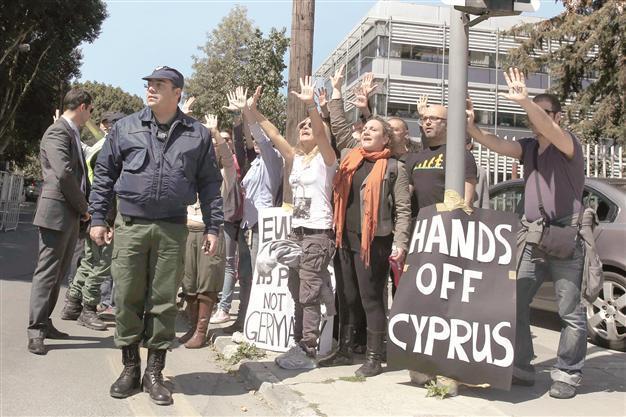
Greek Cypriot demonstrators protest against planned measures to seize 10 percent of savings in national bank accounts as part of an EU bailout deal. REUTERS photo
Russian President Vladimir Putin criticized the European Union’s bailout package that proposed tax on bank deposit in Greek Cyprus as “unfair, unprofessional and dangerous” yesterday as Greek Cyprus’s parliament postponed again a session from yesterday to today for voting on a EU bailout deal that slaps a levy on all Greek Cypriot bank savings, as negotiators scrambled to soften the blow for small deposit holders.Yusuf Kanlı - Analysis
Russian President Vladimir Putin called Greek Cypriot President Nikos Anastasiades on the evening of March 17, and after some angry exchanges, offered to contribute to a rescue plan for cash-strapped Greek Cyprus in exchange for a base on the island, a well-placed Greek Cypriot source has claimed.
Russia has been very much interested in acquiring controling shares of either the Laiki Bank or the Bank of Cyprus for some time. According to the source, Russia has now offered a generous $2 billion for majority shares of the Laiki Bank but signaled also that they might go for the much bigger Bank of Cyprus as well.
A second demand, the source said, was a 50-50 share between Russia and Israel’s Delek in the LNG plant to be constructed in Cyprus. Greek Cypriots have been very much concerned with Israel singlehandedly owning the plant and the Russian partnership demand might be worth seriously considering, the source said.
But a third condition for a “generous” Russian contribution to the Cyprus bailout might be very problematic not only for the island but for the entire EU as well as Turkey and the United States: Russian creation and control of a naval facility to guard the gas terminal.
Israel’s similar demands have been creating issues for some time, but Russia demanding a “naval facility” from Cyprus and expressing that it should have the “unilateral liberty of expanding it as required,” could eventually turn that facility into a full-fledged Russian base.
“Is Russia considering abandoning Syria and moving its base there to Cyprus?” the Greek Cypriot source asked.
President Anastasiades left the House of Representatives and retreated to the modest presidential mansion yesterday to ponder his next move after a vote on the EU bailout plan was delayed. Eurozone officials and representatives of the International Monetary Fund (IMF) and the European Central Bank (ECB) suggested they could consider a revision in the one-off “wealth tax,” nicely worded a “stability levy.” And news that, for the first time ever in the euro crisis, depositors would contribute to the cost of recapitalizing banks, sent shockwaves through Europe and beyond, tumbling stock markets and the euro and sending a very strong message that the ambitious plan probably backfired.
Anastasiades, who was elected president to replace the socialist Demetris Christofias last month, has a very shaky coalition government with 28 seats in the unicameral 56-seat house, where he needs at least 29 votes to legislate the ambitious move. Failing to vote yesterday and agreeing to postpone the issue indefinitely for now – with banks remaining closed – Anastasiades in a way confessed to the international community how fragile his term in office would be. Could a Greek Cypriot president surviving on such fragile political support deliver the long-sought-for compromise settlement?
According to Greek Cypriot sources, officials from countries that use the euro, the IMF and the ECB have already suggested to Aanastasiades that a one-off 9.9 percent “stability levy” on deposits larger than 100,000 euros might provide the required portion of the bailout plan and the levy on deposits smaller than 100,000 euros might be taken down to a much lower rate than the foreseen 6.75 percent. The embattled Anastasiades, however, failed to win the support of the opposition even to take a reduced rate, sources said.